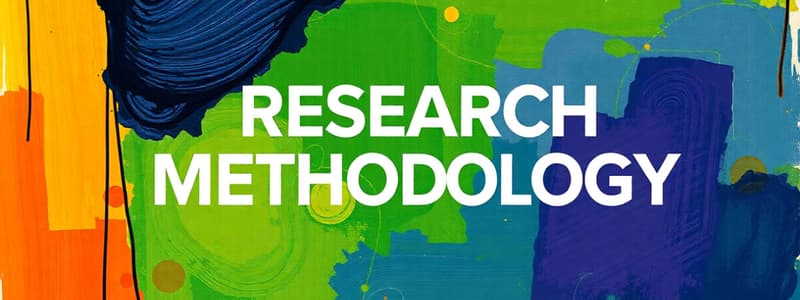Podcast
Questions and Answers
What characteristic makes a topic researchable?
What characteristic makes a topic researchable?
- It is based solely on personal opinion.
- It is purely theoretical and speculative.
- It is universally accepted without evidence.
- It is supported by observable and factual evidence. (correct)
Which factor is NOT listed as a guideline in choosing a research topic?
Which factor is NOT listed as a guideline in choosing a research topic?
- Popularity of the topic among peers. (correct)
- Limitations on the subject.
- Interest in the subject matter.
- Availability of information.
What type of topics should be avoided when choosing a research topic?
What type of topics should be avoided when choosing a research topic?
- Narrowly focused subjects. (correct)
- Broadly defined subjects. (correct)
- Controversial topics.
- High-interest subjects.
Which is a criterion that contributes to the selection of a suitable research topic?
Which is a criterion that contributes to the selection of a suitable research topic?
Why is a highly technical subject often avoided for research topics?
Why is a highly technical subject often avoided for research topics?
What does a good research title need to clearly reflect?
What does a good research title need to clearly reflect?
Which of the following is NOT a component that should be included in a research title?
Which of the following is NOT a component that should be included in a research title?
What is the purpose of the statement of the problem in a research project?
What is the purpose of the statement of the problem in a research project?
What key element should be included in a well-written statement of the problem?
What key element should be included in a well-written statement of the problem?
What type of question is a central question in research?
What type of question is a central question in research?
Which of the following options best showcases good qualitative wording in a statement of the problem?
Which of the following options best showcases good qualitative wording in a statement of the problem?
In writing sub-questions, which of the following should they be?
In writing sub-questions, which of the following should they be?
How should a good research title be structured?
How should a good research title be structured?
What characteristic of a good statement of the problem indicates that it cannot be answered simply?
What characteristic of a good statement of the problem indicates that it cannot be answered simply?
Which element does NOT typically contribute to the clarity of a research title?
Which element does NOT typically contribute to the clarity of a research title?
Which of the following questions is clearly stated and appropriate for a qualitative study?
Which of the following questions is clearly stated and appropriate for a qualitative study?
Which statement is true about the central question of a research study?
Which statement is true about the central question of a research study?
When crafting a problem statement, which phrase should be avoided?
When crafting a problem statement, which phrase should be avoided?
Which of the following best describes a potential answer in a statement of the problem?
Which of the following best describes a potential answer in a statement of the problem?
Which option best demonstrates a focused statement of the problem?
Which option best demonstrates a focused statement of the problem?
In qualitative research, which question helps in crafting a rich statement of the problem?
In qualitative research, which question helps in crafting a rich statement of the problem?
What is the primary purpose of writing research objectives?
What is the primary purpose of writing research objectives?
What distinguishes general objectives from specific objectives in research?
What distinguishes general objectives from specific objectives in research?
Which of the following elements should research objectives identify?
Which of the following elements should research objectives identify?
In the provided study, what central phenomenon is the research focusing on?
In the provided study, what central phenomenon is the research focusing on?
What is a characteristic of specific research objectives?
What is a characteristic of specific research objectives?
What key aspect of research objectives helps avoid unnecessary data collection?
What key aspect of research objectives helps avoid unnecessary data collection?
Which aspect of communication is being investigated in the study related to ischemic heart disease?
Which aspect of communication is being investigated in the study related to ischemic heart disease?
What is an implication of understanding parents' acceptance of psychological treatment for children?
What is an implication of understanding parents' acceptance of psychological treatment for children?
Flashcards are hidden until you start studying
Study Notes
Research Topic Selection
- A researchable topic requires observable, factual, and logical evidence.
- Factors to consider when choosing a topic include:
- Interest in the subject matter.
- Availability of information.
- Timeliness and relevance to current issues.
- Limitations surrounding the subject.
- Available personal resources.
Topics to Avoid
- Controversial topics that could lead to biased results.
- Highly technical subjects that may confuse the scope of research.
- Topics that are hard to investigate or too broad/narrow.
- Vague subjects lacking clear definitions.
Research Title Components
- A good title expresses the central problem succinctly.
- It should reflect key variables being studied and include:
- What: the subject matter.
- Where: locale of the research.
- Who: participants of the study.
- When: time frame of the study.
Effective Statement of the Problem
- A clearly articulated statement outlines the study's purpose and includes:
- Specific questions regarding the research problem.
- Major objectives, guiding the research process.
- Types of questions include:
- Central questions (general scope).
- Sub-questions (more specific aspects).
Writing the Statement of the Problem
- Identify the central phenomenon or issue.
- Use open-ended, evolving questions without predictions.
- Statements must be:
- Clear and focused for easy understanding.
- Concise using minimal words yet complex enough to require in-depth analysis.
- Arguable, allowing for discussion.
Crafting Clear Research Objectives
- Objectives are closely tied to the problem statement and summarize study goals.
- General objectives outline broad expectations.
- Specific objectives detail each phase of the study, specifying methods, locations, timelines, and purposes.
Research Objectives' Importance
- Defining the study focus and identifying measurable variables.
- Indicating necessary steps in the research process.
- Establishing limits of the study to avoid unnecessary data collection.
Examples of Effective Statements
- Provide contextual examples showcasing clear problems and objectives, like exploring night shift experiences in healthcare or characterizing cardiologists' communication with patients.
- State clearly the type of study and desired outcomes, including participant demographics and settings.
Studying That Suits You
Use AI to generate personalized quizzes and flashcards to suit your learning preferences.





